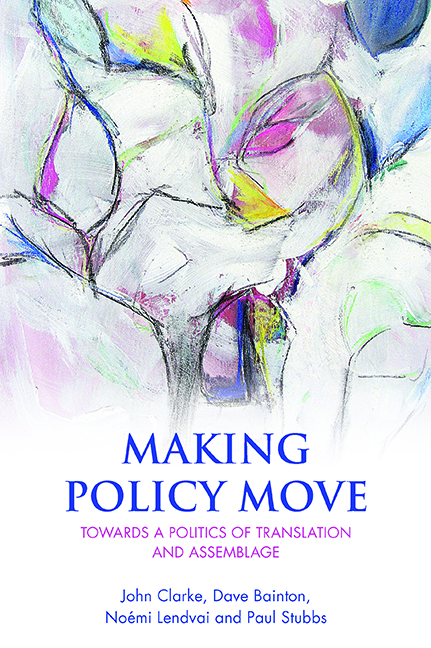Book contents
- Frontmatter
- Contents
- Introduction
- One Moving policy studies
- Two Translation, assemblage and beyond: towards a conceptual repertoire
- Three Performing reform in South East Europe: consultancy, translation and flexible agency
- Four The managerialised university: translating and assembling the right to manage
- Five Soft governance, policy fictions and translation zones: European policy spaces and their making
- Six Translating education: assembling ways of knowing otherwise
- Seven ‘Policy otherwise’: towards an ethics and politics of policy translation
- References
- Index
Four - The managerialised university: translating and assembling the right to manage
Published online by Cambridge University Press: 07 March 2022
- Frontmatter
- Contents
- Introduction
- One Moving policy studies
- Two Translation, assemblage and beyond: towards a conceptual repertoire
- Three Performing reform in South East Europe: consultancy, translation and flexible agency
- Four The managerialised university: translating and assembling the right to manage
- Five Soft governance, policy fictions and translation zones: European policy spaces and their making
- Six Translating education: assembling ways of knowing otherwise
- Seven ‘Policy otherwise’: towards an ethics and politics of policy translation
- References
- Index
Summary
Introduction
A young woman stares at the computer screen in her office. The screen displays a set of categories of how academic time might be spent in her university, with columns for ‘Actuals’ (for the past year) and ‘Projected’ (for the coming year). She must allocate her 230 working days to these categories. She puzzles about how to complete this ‘Academic Workload Management’ form. She seeks advice from her Head of Department (aka line manager) and her mentor. One says ‘just make sure the days add up to 230’, the other says ‘it looks more plausible if you don't put round numbers in’. She finds the advice both reassuring and not at all helpful.
In this chapter, I explore some of the conditions that make this vignette possible. How does academic time come to be calculable and manageable in these ways? How do heads of department come to be imagined as line managers? How do such management technologies and practices engender dismay and cynicism? In order to do this, I need to consider management as a travelling idea and assemblage that is translated into different spaces and settings. This places the chapter in a distinctive relationship to our collective interest in translation, as established in Chapters One and Two: the processes of translation explored here all take place within English, rather than involving translation between languages. Nevertheless, the analysis is rooted in the idea that there is more than one English. Management is articulated as a distinctive way of thinking, calculating and ordering the world that has complicated relations with other ways of thinking, calculating and ordering. Thus, what are at stake are practices of translation, even if the apparently common language conceals the extent to which translation is in play. The chapter also explores the ways in which power is a central coordinate of the work of assemblage; indeed, it suggests that in the process of translation, the forms and sites of power and authority are reassembled. In this way, the chapter fills out one key aspect of our efforts to use the concept of assemblage. However, the opening vignette is not just about management in general, nor even the more specific form sometimes called the New Public Management (NPM); it also requires attention to higher education (HE) as a sector and the university as an organisational formation in which management has come to be embedded.
- Type
- Chapter
- Information
- Making Policy MoveTowards a Politics of Translation and Assemblage, pp. 95 - 130Publisher: Bristol University PressPrint publication year: 2015



